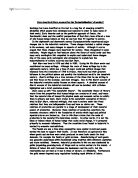Henri demonstrates the need for companionship as well as the need to be alone for intermittent periods of time. Living in a boat with a "cramped cabin and the lack of a toilet", results in driving his girlfriend away. He repeatedly experiences loneliness. However, after he becomes used to the idea of being alone, Henri "felt a sense of relief." By eating what he wants and "free of the endless biologic functions for a while," Henri exemplifies how ‘time-out’can help a person rejuvenate, while maintaining an outgoing lifestyle to balance his life.
William, (also more popularly known to be Dora's bouncer) on the other hand yearns to be part of ‘Mack and the boys’. He admires the way they simply allow life to take its own course. But when Mack exclaims, "God damn it, I hate a pimp," this alienates William from the society he so desired to be part of and his loneliness drives him to desperation. He resorts to suicide as is unable to with the life he led any longer. Without unconditional positive regard, usually attained from friends and significant others, his self-confidence and sense of belongingness plummeted to almost nonexistent. He claimed that he would "bump himself off ", and consequently no one takes him seriously. Dora responds nonchalantly by saying, "do it in your own time and don't mess up the rugs." And that was the end of William.
Frankie is the absolute loner. He had no one until he stumbled across Doc who accepts him although "he couldn't learn and there was something wrong with his coordination." No one in the world including his parents cared about him except Doc. The closeness he has with Doc leads him to steal from Jacob's Jewelry Store. Wanting return the favor for Doc drives him to drastic measures, of which he was not fully aware of due to his limited mental capacity; violating the law. Frankie is compelled to steal for Doc because in Frankie's eyes, Doc took extreme measures for him by doing what nobody else would and accepting him as an equal human being. During one of Doc’s parties, Frankie whips up some drinks and attempts to serve them until he reeled off of his path by a distraction. This action symbolizes his desire to mingle with others after Doc initiated him with an ego-boost but making him feel at ease.
As for the adventurous and unemployed group of Mack and the boys (Hazel, Eddie, Hughie and Jones) who live in a fish-meal shack on Cannery Row decide that they should do something nice for Doc. This ‘gang’ must be viewed from a totally different retrospective, as they all retain more or less the same functions of one another and do not really need to ‘fit in’. They do however plan to give Doc a party and give him a swarm of frogs to repay Doc for the numerous times he has helped each member of the group. Though their party turns out to be a complete disaster, after Cannery Row goes through a period of depression the citizens begin to feel better. Hence Mack and the boys throw a very successful “surprise” birthday party for Doc that everyone attends, including Lee Chong,. Dora and the girls from the whore house who were off duty and ironically transformed into perfectly respectable ladies, and Henri, Gay and Mr. and Mrs. Malloy.
The morning following the party Doc awakens and reminisces while reflecting on life as all matters returns to normal on the Cannery Row. Although the party was towards the end of the book, I believe that it symbolizes a belated turning point as well as a happy ending. Finally did all the characters in Cannery Row who attended the party felt mutual vibes; A relaxed feeling of togetherness and cooperation.
Being socially rejected can be the worst feeling in the world and Steinbeck’s characters depict the human instinct to be included in society. In today's fast paced, ever-changing, and savage world, nothing has changed. People like William, Henri, Frankie, and Mack’s gang who are socialized into being lonely through constant rejection do drastic things out of desperation and/or frustration. When everyone finally accepted each other at Doc's party, it merely proves that if only we were a little bit more accepting and not so obsessed with ‘fitting in’, humans despite their differences, can all be part of one another, creating a closely knit, functional society in which we can all securely and happily live.







